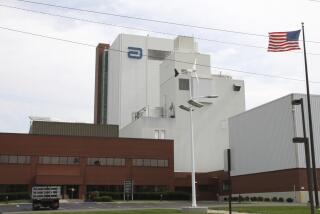Biogen Sells Drug Factory to Genentech
- Share via
Biogen Idec Inc. on Thursday sold a big drug factory in Oceanside, Calif., that was slated to produce Tysabri, deepening pessimism about the drug’s future.
The buyer was Genentech Inc., a rival biotechnology firm that needed additional manufacturing capacity for its cancer drugs.
Biogen, based in Cambridge, Mass., said it would receive $408 million for the biotechnology drug plant, the sixth-largest in the world. The plant was completed last year.
The 430 people working at the factory are expected to be employed by Genentech or retained by Biogen, the companies said. South San Francisco-based Genentech said it planned to hire an additional 200 workers by the end of 2006.
Biogen said it would take an after-tax charge of $50 million to $57 million in connection with the sale. The company said it spent $380 million to build the factory and $100 million to prepare it to produce Tysabri, a treatment for multiple sclerosis. The drug was withdrawn in February after two patients developed a rare, life-threatening illness after receiving it.
Biogen said it was reviewing safety information about Tysabri and expected to have a decision about the drug’s future by the end of the summer. Biogen developed the drug with Elan Corp., an Irish drug company.
Biogen spokesman Jose Juves said the company had been producing Tysabri at its North Carolina factory and would continue to do so if the drug returns to the market.
But some analysts viewed the factory sale as an acknowledgment on the part of Biogen that prospects for Tysabri had significantly dimmed. Only a year ago, many on Wall Street thought that Tysabri eventually could have annual sales of $1 billion.
“It is nice that Biogen is finally being realistic,” said Geoffrey Porges, an analyst at Sanford C. Bernstein. He said it was unlikely that Tysabri would be cleared for sale.
For Genentech, the factory will provide one-third of the manufacturing capacity needed by 2009 to meet anticipated demand for Avastin, Porges said. The drug is approved as a treatment for colon cancer, but it also has demonstrated effectiveness against lung and breast cancers in recent trials. Avastin is being tested in other forms of cancer, and many on Wall Street believe it can become a multibillion-dollar product.
Genentech called the factory a “unique and valuable asset” that would help it meet an “aggressive production plan.”
The factory, located 80 miles south of Los Angeles, has a bumpy history. When the former Idec Pharmaceuticals Corp. acquired the 60 acres overlooking the Pacific, it figured the factory would produce one of three promising drugs that were then in development. But by the time the former San Diego company broke ground in 2002, all three drugs had hit setbacks in clinical trials.
Rather than cancel the project, Idec searched for a drug to license from other biotechnology companies that it could make at the factory. Those efforts led to its $5.4-billion merger with Biogen in 2003, and later plans to produce Tysabri there.
More to Read
Inside the business of entertainment
The Wide Shot brings you news, analysis and insights on everything from streaming wars to production — and what it all means for the future.
You may occasionally receive promotional content from the Los Angeles Times.










